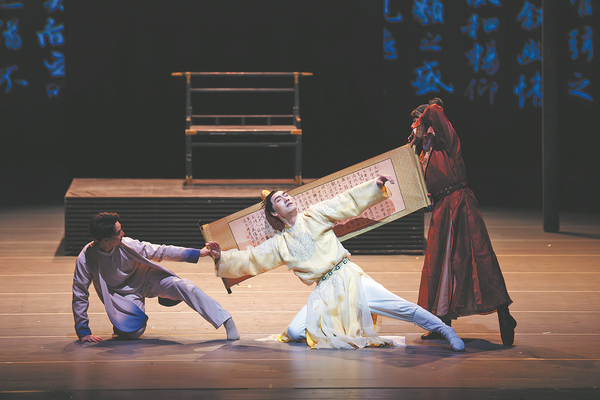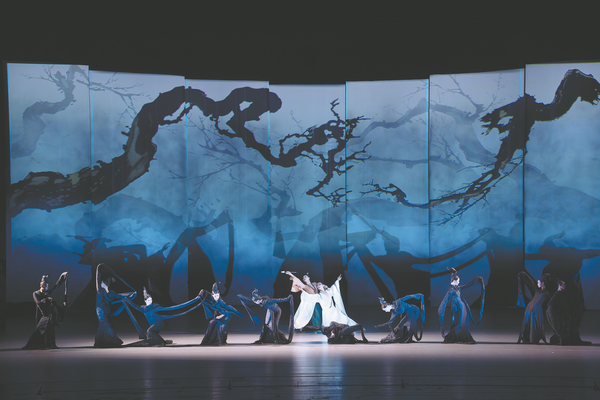Dance Shows Poetry in Motion
 |
| Yonghe Jiunian (Dance of Calligraphy in AD 353), an original Chinese dance drama produced by the Shanghai Opera House, portraying the beauty of calligraphy through dance movements, is touring nationwide. Directed and choreographed by Wang Yabin, it is inspired by Lantingji Xu (Preface to the Collection of Poems of the Orchid Pavilion), a piece of prose by 4th-century calligrapher Wang Xizhi. [China Daily] |
Elegance and beauty of calligraphy take audience on journey into ancient China, Chen Nan reports.
The timeless elegance of Chinese calligraphy has been captured in Yonghe Jiunian (Dance of Calligraphy in AD 353), produced by the Shanghai Opera House, which premiered in November 2023 in Shanghai and is now touring nationwide.
It made its debut at the National Centre for the Performing Arts in Beijing with three shows from May 10 to 12. During the second half of this year, it will be staged in more cities, including Yantai, Shandong Province; Yinchuan, Ningxia Hui Autonomous Region; Nanning, Guangxi Zhuang Autonomous Region; and Kunming, Yunnan Province, before returning to Shanghai in August.
It is inspired by Lantingji Xu (Preface to the Collection of Poems of the Orchid Pavilion), a piece of prose by 4th-century calligrapher Wang Xizhi, which was written in AD 353. The dance drama, directed and choreographed by Wang Yabin, offers a captivating glimpse into the ancient origins and enduring legacy of the revered Lantingji Xu through a contemporary lens.
"I worked on this dance drama for a long time, trying to find a good way to tell the story about the allure of Chinese calligraphy through the beauty of dance. I love calligraphy; I also learned to write in the ancient art of Chinese handwriting," says director Wang Yabin, who is also a dancer-choreographer. "For me, dancing is also a kind of calligraphy. I write in calligraphy with my brush and I dance with my body. Both of them allow for fluid, controlled movement."
 |
| Yonghe Jiunian (Dance of Calligraphy in AD 353), an original Chinese dance drama produced by the Shanghai Opera House, portraying the beauty of calligraphy through dance movements, is touring nationwide. Directed and choreographed by Wang Yabin, it is inspired by Lantingji Xu (Preface to the Collection of Poems of the Orchid Pavilion), a piece of prose by 4th-century calligrapher Wang Xizhi. [China Daily] |
She adds that the most challenging part of making this dance drama was to decode the ancient ink artistry with contemporary expression, guiding the audience through an artistic journey transcending time to reflect upon the birth and legacy of Lantingji Xu.
The dance drama begins with a young man's exploration of Lantingji Xu. Set against the backdrop of lush bamboo forests, it gradually unfolds the beautiful scroll. The young man, who comes from the contemporary world, has embarked on a journey back to ancient China when the famous calligrapher, Wang Xizhi, wrote the classic piece. Male dancers, amid the rhythmic beats of drums, move onstage, seamlessly merging the essence of calligraphy projected on screen with their bodies. The dance drama integrates calligraphic elements into the visual experience, mimicking strokes through the dynamic movements of the dancers' bodies. Supported by multimedia technology, the stage transforms into different scenes, such as bamboo forests, streams, warfare and the imperial court.
Li Shimin, posthumously known as Emperor Taizong of the Tang Dynasty (618-907), was an admirer of Wang Xizhi's calligraphy, having collected a large number of his works. The original version of the Lantingji Xu was said to have been buried along with the emperor.
In the dance drama, the young man also travels to the Tang Dynasty. Through a solo dance by Zhang Aoyue, who plays the role of the emperor, audiences witness the inner thoughts of the emperor, who expresses his fondness and respect for Wang Xizhi and Lantingji Xu.
 |
| Yonghe Jiunian (Dance of Calligraphy in AD 353), an original Chinese dance drama produced by the Shanghai Opera House, portraying the beauty of calligraphy through dance movements, is touring nationwide. Directed and choreographed by Wang Yabin, it is inspired by Lantingji Xu (Preface to the Collection of Poems of the Orchid Pavilion), a piece of prose by 4th-century calligrapher Wang Xizhi. [China Daily] |
As the young man returns to modern times and studies the successive copies of Lantingji Xu with countless calligraphy enthusiasts, they become the guardians of the classic piece, embracing the responsibility of continuing the legacy.
Wen Geng, a dancer with the Shanghai Opera House dance troupe, plays the role of the young man. Song Yu, the principal dancer of the troupe, portrays the calligrapher Wang Xizhi.
It is said that Wang Xizhi derived inspiration from nature, such as the graceful neck movements of geese. In the dance drama, director Wang Yabin created a goose character played by Tan Yimei, also a principal dancer of the Shanghai Opera House troupe. With a pas de deux, Wang Xizhi's love for the beautiful creature has been realized on the stage.
According to Wang Yabin, the dance drama Yonghe Jiunian is named after the year AD 353 when Wang Xizhi wrote Lantingji Xu, or the ninth year of the Yonghe era during the Eastern Jin Dynasty (317-420). Yonghe is translated as eternal harmony.
Composer Lyu Liang used the ancient Chinese instrument, the seven-stringed guqin, as the main component throughout the dance drama. This was supplemented by more traditional Chinese musical instruments, such as the pipa (a Chinese lute), guzheng (a Chinese zither), xiao (a vertical bamboo flute); xun (an oval flute-like clay instrument) and erhu (a two-stringed bowed instrument), creating a rich palette of sounds to propel the plot.
"There are many scenes in which the director tells the story with flashbacks. The music is a supporting technique to make the flashbacks work for the audience," adds Lyu, who is known for his composition for Poetic Dance: The Journey of a Legendary Landscape Painting, one of the best-selling dance dramas, which has toured China with more than 200 shows since its premiere in 2021.
"Chinese classical dance fits well with this dance drama, Yonghe Jiunian, combining rhythmic twists, turns and curves, the dancers mimicking the strength, amplitude, and fluidity of calligraphy strokes," says Zhao Lei, Party secretary and executive vice-president of the Shanghai Opera House.
 |
| Yonghe Jiunian (Dance of Calligraphy in AD 353), an original Chinese dance drama produced by the Shanghai Opera House, portraying the beauty of calligraphy through dance movements, is touring nationwide. Directed and choreographed by Wang Yabin, it is inspired by Lantingji Xu (Preface to the Collection of Poems of the Orchid Pavilion), a piece of prose by 4th-century calligrapher Wang Xizhi. [China Daily] |
 |
| Yonghe Jiunian (Dance of Calligraphy in AD 353), an original Chinese dance drama produced by the Shanghai Opera House, portraying the beauty of calligraphy through dance movements, is touring nationwide. Directed and choreographed by Wang Yabin, it is inspired by Lantingji Xu (Preface to the Collection of Poems of the Orchid Pavilion), a piece of prose by 4th-century calligrapher Wang Xizhi. [China Daily] |
(Source: China Daily)
Please understand that womenofchina.cn,a non-profit, information-communication website, cannot reach every writer before using articles and images. For copyright issues, please contact us by emailing: website@womenofchina.cn. The articles published and opinions expressed on this website represent the opinions of writers and are not necessarily shared by womenofchina.cn.








.jpg)

 WeChat
WeChat Weibo
Weibo 京公网安备 11010102004314号
京公网安备 11010102004314号